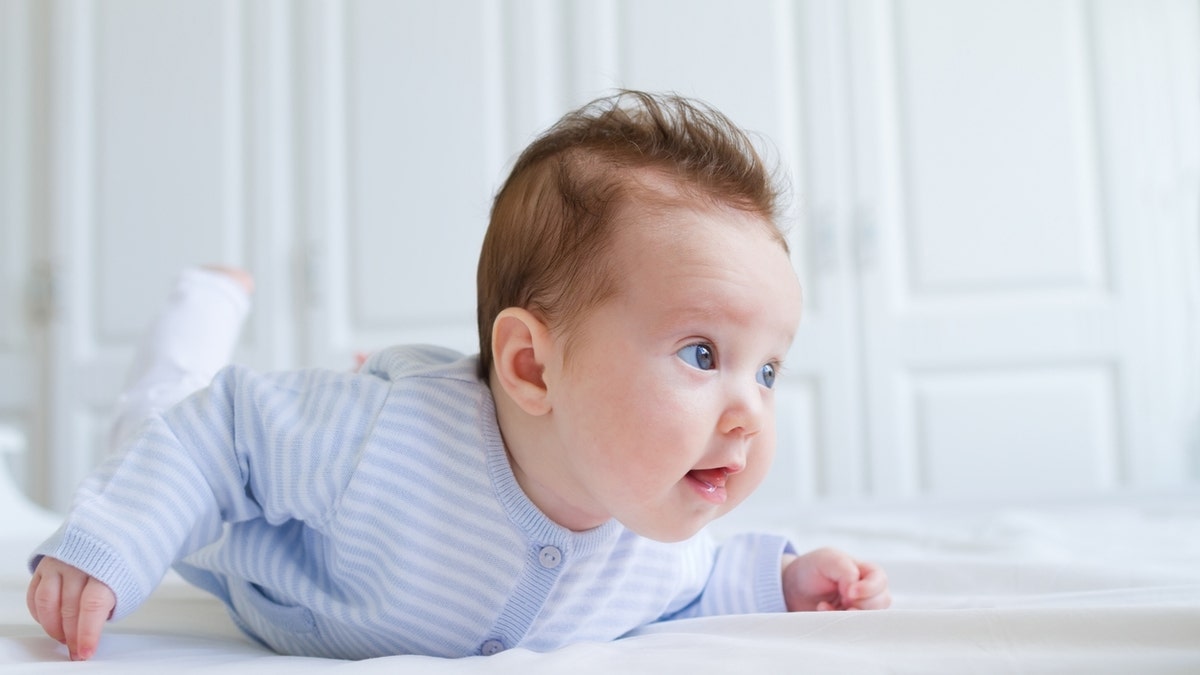
Smiling baby tummy time in a white nursery (iStock)
With about one-third of children in the United States who are overweight or obese, most parents know their kids should be getting at least an hour of exercise each day. Exercise not only helps with weight control, but it helps kids build healthy muscles, bones and joints, improves their self-esteem, helps them sleep better, and may even prevent depression later on in life, a January 2017 study in the journal Pediatrics found.
However, experts say the time to get kids moving isn’t when they take their first steps but rather weeks after they’re born.
“What we know about development is that every stage builds one thing upon another and the brain-behavior relationships are built easier when you’re younger,” Jane Clark, PhD, professor and chair of the department of kinesiology at the University of Maryland, told Fox News.
ITCHY SKIN DURING PREGNANCY SHOULD NOT BE IGNORED
Just as talking, reading and singing to babies promotes cognitive and speech development, movement from the very beginning helps babies facilitate their motor milestones.
Tummy time is baby’s first exercise.
“At around 6 weeks, you should feel comfortable throwing a blanket down on the floor and putting your baby down on it because that’s the beginning of exercise and movement,” Dr. Corinn Cross, a board-certified pediatrician in Los Angeles and a spokesperson for the American Academy of Pediatrics (AAP), told Fox News.
Tummy time every day helps babies build their upper body strength so they can hold up their heads, push up and then later roll over, crawl, pull up to stand and eventually walk.
7 SIGNS YOU'RE HITTING THE MOMMY JUICE TOO HARD
Starting tummy time early can also foster independence and prevent you from having to strap your baby in an infant seat, swing or bouncer, or put him in a playard when you need to get things done. “I think [parents] do it out of safety, but I think you just have to find a safe place,” Cross said.
Do babies need fitness classes?
Mommy and me yoga, gymnastics and music classes are all great ways to get your baby moving, but don’t sweat it if it’s not possible for your family because your baby won’t lag behind on his milestones, Cross said.
According to the American Academy of Pediatrics (AAP), there isn’t enough evidence that these classes promote physical activity or prevent obesity, but they say babies should have a “safe, nurturing and minimally structured play environment.”
10 REASONS YOU CAN'T LOSE THE BABY WEIGHT
So find natural ways for your baby to move and interact at home and with other children — at the park, a children’s museum or on playdates, for example.
Sing, dance and move with your baby.
Experts say parents should avoid putting their babies in infant car seats, strollers, and bouncers when it’s not necessary and avoid giving their babies a phone, iPad or digital device to distract them.
Instead, natural play is a great way to get babies moving. Sing, dance and bounce your baby, and lift him up in the air. Hold your baby on your lap, encourage him to stand up, and then slightly lean him to each side. “You’re actually getting them to make adjustments in their body, in their torso muscles and in their legs,” Clark said.
WHAT EVERY MAN SHOULD KNOW ABOUT SEX AFTER PREGNANCY
As your baby gets older, encourage him to crawl and sit up by placing blocks, cups and toys he can reach for in front of him. “You put toys in front of them and they’re going to be more active, they’re going to move, and that sets them up better for life,” Cross said.
Get toddlers moving.
The Society of Health and Physical Educators (SHAPE America) recommends toddlers get 30 minutes of structured physical activity and at least 60 minutes of unstructured physical activity every day. According to the organization, toddlers also should not be sedentary for more than an hour except when they’re sleeping.
However, the reality is that many toddlers fall short. Preschoolers in child care centers only get 48 minutes a day of activity and only 33 minutes a day are spent outside, a 2015 study in the journal Pediatrics found.
FOLLOW US ON FACEBOOK FOR MORE FOX LIFESTYLE NEWS
What’s more, only 19 percent of kids play outside and get at least an hour of exercise every day, a 2012 survey by the YMCA found.
Providing opportunities for movement early on will ideally help kids not only have the skills but also the confidence to participate in sports, martial arts and dance when they’re older.
“You’re not going to be physically active if the only thing you can do is walk,” Clark said. “If you don’t have the competence, you won’t have the confidence.”
